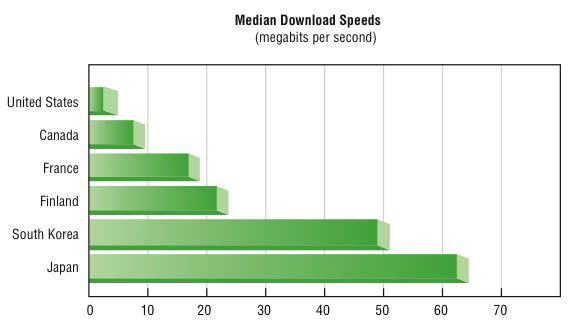US Broadband Speeds Lagging Behind
Aug 15th, 2008 | By James Lewin | Category: General 
Speed Matters, a broadband advocacy project of the Communications Workers of America (CWA), has released its second annual state-by-state Internet speed report, and the results show the U.S. still has a long way to go to catch up with the rest of the world.
The report found that the average U.S. Internet speed was 2.3 megabits per second (mbps), representing a slight gain of 0.4 mbps over last year’s average speed. At this rate, it will take us more than a hundred years to catch up to Japan, where average speeds are estimated at 63 mbps.
The new report is based on data from nearly 230,000 Internet users who took the Speed Matters Speed Test — almost three times the number of tests taken for last year’s inaugural state-by-state report. The fastest states were Rhode Island, Delaware, New Jersey, Virginia, and Massachusetts, while the slowest speeds were in rural states: Idaho, Wyoming, Montana, North Dakota, and Alaska.
Speed Matters argues that broadband speeds are necessary for America to be competitive.
“This isn’t about how fast someone can download a full-length movie,” says CWA President Larry Cohen. “Speed matters to our economy and our ability to remain competitive in a global marketplace. Rural development, telemedicine and distance learning all rely on truly high-speed, universal networks.”
But it also matters when you want to download that full-length movie – because it will take 27 times as long in the US as it would in Japan, based on Speed Matters’ numbers.
Broadband speeds are an important factor contributing to the adoption of podcasts, video podcasts, Internet Video and other new media, and are likely to limit adoption in the US, unless average speeds rise.
One should also take into account that we have more broadband users than, probably, most of the countries on the list. The more users there are, the more bandwidth we have to share. At least, that’s what it seems to me.